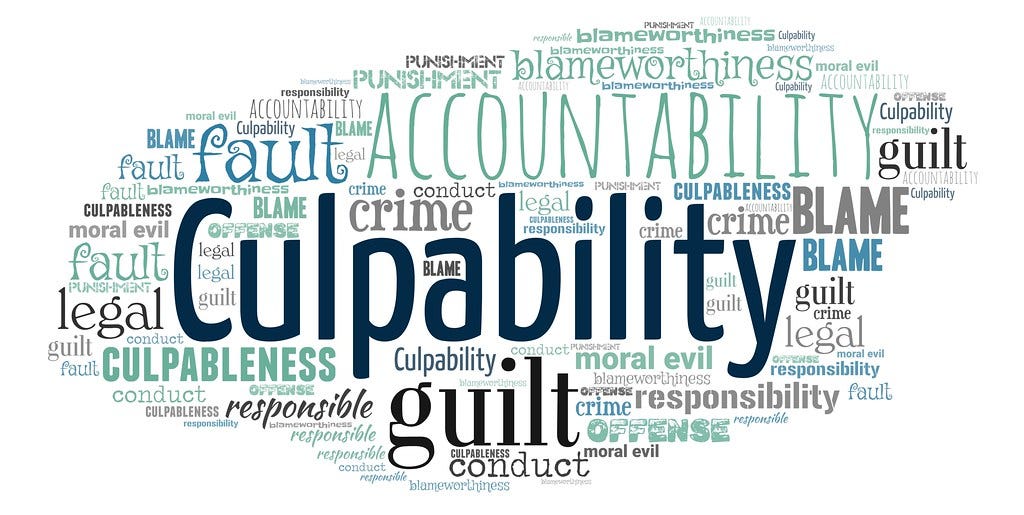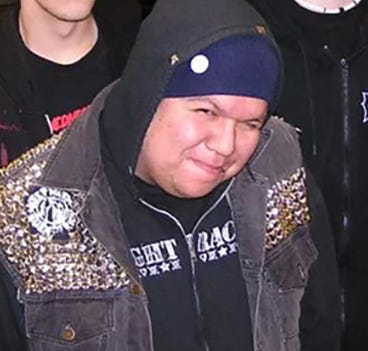Coutts Two Sentencing - A Question of Crime and Punishment
Does the punishment fit the crime -- or does it fit the politics?
Tony Olienick and Chris Carbert, the two men known as the Coutts Two, now face a sentence of six and a half years in prison after being convicted on charges of mischief over $5000, and possession of weapons for a dangerous purpose. A jury found them guilty of both offences in early August of this year, while acquitting them on the very serious charge of conspiracy to murder police.
Given that they were exonerated on the conspiracy charge, they, and their supporters hoped their sentence would be held to the 940 days they had already served in remand custody where they have been since they were arrested in Coutts, Alberta, in February of 2022, during the border blockade protests against government COVID mandates. While the presiding judge, David Labrenz, in delivering their sentence in a Lethbridge, Alberta courtroom on September 9, did credit them some four years for ‘time served’ – as extra credit* is often accorded prisoners for their time spent in remand while awaiting trial – this still means the men will spend at least another two years behind bars, likely in a federal prison.
*In most cases prisoners are credited 1.5 days in their sentences, for each day spent in remand due to the hardships faced in remand centres that lack most of the facilities with which prisons are equipped to address prisoners’ needs.


Given the severity of their sentence many supporters were of the opinion that Judge Labrenz had still taken into account elements of the conspiracy charge despite that acquittal. For example he said he believed that the pair had brought guns to the protest* with the intention of having a ‘shoot-out’ with police. “Both armed themselves for the purpose of using those weapons against police,” adding that, “they even attempted to smuggle more guns.” He was, however, “not sure if the plan was successful?!”
*To clarify — the men never brought a gun onto the actual site of the protest. The guns that were seized were found in the trailer belonging to Carbert that had been parked on the property of a resident of Coutts, who had given him permission to park there.
Those statements by the judge do seem to allude more to the conspiracy charge than the offence of being in possession of a weapon for a dangerous purpose, given that the judge seems to have unilaterally decided that the dangerous purpose was definitively to shoot police. This seems to undermine the jury’s verdict. They found the men not guilty of the conspiracy, which would indicate that they did not find the testimonies of the three female RCMP undercover officers (UCO) who recounted their conversations with the men about any type of conspiracy, particularly convincing. This is likely due to the fact that for some unknown reason the UCOs did not wear wires when they infiltrated the protest and therefore they had no tapes of ‘said’ conversations with the men to back them up their testimonies.
Yet, Judge Labrenz seems to have given considerable weight to their testimonies. The only distinguishable difference Labrenz seemed to make on the subject of conspiracy was that, rather than viewing the men as ‘co-conspirators’ as the Crown had alleged, he saw them as acting independently. The being that each man ‘individually determined’ to enact the same plan. "I consider it a last-ditch effort to stand against the government, a self-imposed responsibility to continue the blockade until the government heard their demands." said Labrenz.
From this he concluded that their activities presented a “credible threat to police and the public.” While Labrenz’s words are not the same, they do bear some similarity to the words Public Safety Minister Marco Mendicino used when he was referring to the ‘situation’ at Coutts, describing it as dangerous criminal activity that, “could have been deadly for citizens, protesters and officers.” And, it was this ‘situation’ at Coutts, and the arrest of these men, that became the catalyst for the Trudeau government to invoke the Emergencies Act, which imposed Martial Law across the country and brought an end to the Freedom Convoy protest in Ottawa.
Then there is this statement that he made in delivering the sentence, it seemed an attempt to address his concern that some might think his sentence did still factor in the conspiracy charge. "I am not sentencing the offenders for uncharged terrorism offences or the conspiracy to commit murder charges. If they were convicted of these offences, they would have been sentenced to a penitentiary for double digits." Why did he mention ‘uncharged terrorism offences’ – what does that even mean? Was this something considered at the time of their arrests; even if it was, why mention it now?
Labrenz, in passing sentence, said both men bore a high degree of moral culpability. This is not simply a general description of their actions. Rather, in legal parlance it is a measurement of the degree of moral blameworthiness the judge is placing on the individuals on whom he is passing sentence. Ergo – the higher the degree of moral culpability – the longer the sentence. It is based on the principle that those causing harm intentionally should be punished more severely than those causing harm unintentionally. And according to the judge, "They knew what they were doing was illegal, but they did not care because they believed they had a worthy cause."
So, it would appear, from Labrenz’s perspective he did think they intentionally ‘planned’ to cause harm – again that conspiracy element seems to rear its head again — yet they did not physically harm anyone. The only ‘harm’, it would seem, was their participating in a protest that blockaded the border, but according to the judge, “They were prepared to do more than blocking (the highway) both armed themselves for the purpose of use against police.” There’s that conspiracy factor creeping in again.
With regard to the border blockade from which the mischief charge stemmed — Labrenz did not consider the authorities provided by the men’s defence lawyers to mitigate sentencing he because felt the gravity of the situation differed from the precedents the defence had put forward. This, according to the judge, was due to the decision taken to block an international highway with political motivations to force a change in government policy.
“The law does not allow people to take the law into their own hands. There's no shortage of people who believe that their cause is just, with impatience for democratic processes ...however section 718 of the code states the fundamental purpose of sentencing is to protect society,"
Labrenz described the protest as political in nature that resulted in economic harm, designed to force political change. Yet, by contrast, the many people who participated in the border blockade protest at the Ambassador Bridge in Windsor, at the same time, have since had their mischief charges dropped or reduced, while others paid restitution in the form of making cash donations the charities. Those protesters had also blocked what was actually a much more important border in terms of causing economic damage in order to ‘force political change.’
Labrenz also considered case law with respect to the sentencing of Pastor Artur Pawlowski for preaching a sermon to the Coutts protesters, and of James Sowery, who was accused trying to run down a police officer with his truck at a protest check point, both of which cited the men’s political motivations. It should be noted that while both the pastor and Sowery were found guilty and sentenced, the verdicts in both cases are currently under appeal. Nevertheless, Judge Labrenz said he was delivering a “deterrent sentence, to signal, not just to the defendants, but to everyone else, that putting police officers and the public in jeopardy would not be tolerated.”
So, the judge who told the jury not to consider arguments put forward by Olienick’s lawyer about political motivations on the part of the Crown, the police and the government with respect to the trial is now talking about political motivations on the part of the defendants and the protest as a whole.
In a nutshell these are the reasons, and the cases Judge Labrenz gave, plus more that is just to complex to get into here, that led him to determine that Carbert and Olienick still needed to serve more time behind bars than they already had.
Now just to give this sentencing a new perspective — let’s look at another convoy case, where a guilty party served much less time, in fact, no time all. That would be the case of David Zegarac. He is the Antifa member and punk rocker who, with his jeep, rammed into and injured four Freedom Convoy protesters in Winnipeg and left the scene of the accident back in February of 2022. One man was sent to hospital with head and arm injuries, while the others incurred minor injuries and were no doubt pretty shaken up by the experience. So this was a case where the defendant did harm someone, and intentionally — it would seem.
Yet, at his trial in 2023, Zegarac was only sentenced to two years of house arrest after pleading he guilty to “two counts of dangerous operation of a motor vehicle causing bodily harm and one count of failing to stop at the scene of an accident causing bodily harm.” It should be further noted that when police finally arrested him they had to subdue him with a taser, but he was not charged with resisting arrest. Zegarac was also granted bail* until his trial and sentencing. Meanwhile, Carbert and Olienick didn’t physically injure anyone, nor did they resist arrest when they were apprehended by police.
*While Zergarac was out on bail he found himself in trouble with police again for a case involving child pornography. In October of 2022, months before his sentencing on the previous crime, he was charged with possession of child pornography, luring a child under 18, and selling child pornography and resisting a police officer. This final charge was due to the fact that police, again, had to use a taser to subdue an extremely uncooperative Zerarac. The outcome of these charges are unknown.
I only mention Zegerac’s case because of his connection to the convoy, but it is small potatoes compared sentences that have been handed down by judges to people who can only be described as having committed the most heinous crimes against the most vulnerable and helpless members of our society – children. And despite the excuses or mitigating circumstances some of the guilty parties have used to explain their actions, their moral culpability is clear in terms of intentionally causing harm, meaning the punishment should be severe — yet it was not. Now legal experts may say I am comparing apples to oranges, but the court of public opinion might not quite see it that way. You be the judge, if you can stomach it.
Let’s start with 6.5 years, it seems appropriate, given that is the sentence handed to Olienick and Carbert. It is the same sentence given to a Windsor man (name withheld to protect the identity of surviving child), in 2021, for killing one of his seven-week old twin sons. The crying of the babies, while his wife was making dinner, upset him so much he that he physically attacked and shook both infants so violently that one died of brain injuries, while the other managed to survive ‘only’ suffering facial injuries. The original murder charge was reduced to manslaughter. He actually received six years on the manslaughter charge. The additional six months was for injuring, I repeat the seven-week old baby he didn’t manage to kill.
Then there is the eight year sentence handed to Sherman Whitford for beating 16-month-old baby - Veronica Poitras – to death while her mother was out buying groceries. What triggered his attack on the child he never said, but her autopsy revealed a shattered skeleton with three skull fractures. As Whitford was of Indigenous heritage, the eight-year sentence was considered ‘particularly harsh’, but the judge ruled that the crime was so heinous it ‘must be denounced.’
Or how about this ten year sentence that two foster parents received in June of 2023, for the torture, serial beating and starvation of an 11 boy and his eight-year-old sister in their ‘care’. They routinely beat them with two-by-fours, restrained them with zip ties, forced them to eat their own faeces and vomit, and starved them to the point that both children resembled Holocaust victims. To add to this depravity they videotaped their actions. The boy ultimately died as the result of the beatings. These monster’s, whose names weren’t released in order to protect the identity of the surviving child, plead guilty to aggravated assault and manslaughter. I use this ten year sentence as an example to remind readers that the Crown was seeking a nine year sentence for Olienick and Carbert on the charges of mischief and weapons possession.
Here’s another 9 and a half year sentence that was handed to Tyriq Kootenay, for viciously beating his six-month old daughter, Tanayah, to death. The judge in passing the sentence said it was difficult to imagine a more egregious circumstance in which a human being could die. Her autopsy revealed numerous blunt force injuries, contusions and abrasions to her face, head, neck and torso. She had a fractured skull, her arms and ribs were broken and there was also a large bite on her back. Police found Tanayah’s battered body stuffed in a suitcase.
And this all brings me back to the question in my headline - does the punishment fit the crime? The biggest problem I have in asking that question, is what crime is being punished? Because many of the comments made by Judge Labrenz in outlining his reasons for the length of the sentence seem to imply he still believed the men were guilty of some form of ‘conspiracy’ to kill police. Words and phrases like they intended to have a “shoot-out with police”. But rather than accusing them of conspiring together, he views them as acting independently. Yet, he then accuses ‘them’ of attempting to smuggle more guns into the protest, but didn’t appear that ‘their’ plan had been successful.
Then comes that phrase that their activities presented a “credible threat to police and the public.” I likened it to the words used by Public Safety Minister Mendicino hours before the Trudeau government invoked the Emergencies Act… he described ‘dangerous criminal activity’ in Coutts “that could have been deadly for citizens, protesters and officers.” Labrenz’s words are not as alarming as Mendicino’s — who is, after all a politician given to the use of hyperbole, nevertheless both convey the same message — a danger to the public and police.
However, when a jury found both men not guilty of the ‘conspiracy to murder police’ this August, that ‘threat’ to police and the public for matter, should, from a legal perspective, was considerably diminished, thus removing a key element of the Trudeau government’s reason for invoking the Emergencies Act. But the judge seemed to inject the ‘murder police element’ back into the equation in his sentencing of the men in using words such as ‘intent to harm’ and ‘moral culpability’ to assert as he clearly stated: “They were prepared to do more than blocking (the highway) both armed themselves for the purpose of use against police.”
In one of my articles on this subject I compared the Liberal government’s serendipitous subterfuge regarding its motives for invoking the Emergencies Act to crush the Freedom Convoy to a house of cards teetering on the brink of collapse. I said the removal of any key card, could bring the whole house down. One of those cards was the ruling be Federal Court Justice Richard Mosley that the use of the Act was unconstitutional and illegal. Another was the exposing the ‘conspiracy to kill police’ charge against the Coutts men as a false flag intentionally meant to give the Trudeau government the reason it needed to invoke the Act. A jury removed that card in August, but it would appear Judge Labrenz, in the tone and tenor of his sentence and the punishments he imposed on the men, just put it back. How ironic for a judge who warned the defence lawyers and the jury to keep politics out of the case.













An excellent examination, Roxanne, and you make a great point about how Labrenz tore a strip off Marilyn Burns for suggesting the case was political, but then used the perceived political motivations of the men as a factor in sentencing.
The man has no consistency, and was clearly caving to pressure.
I am so disgusted by and furious at our justice system- there is nothing just about that sentence or the many others given to people who hurt children. It appears the judge desperately wants to destroy these men's lives. This is all so wrong!